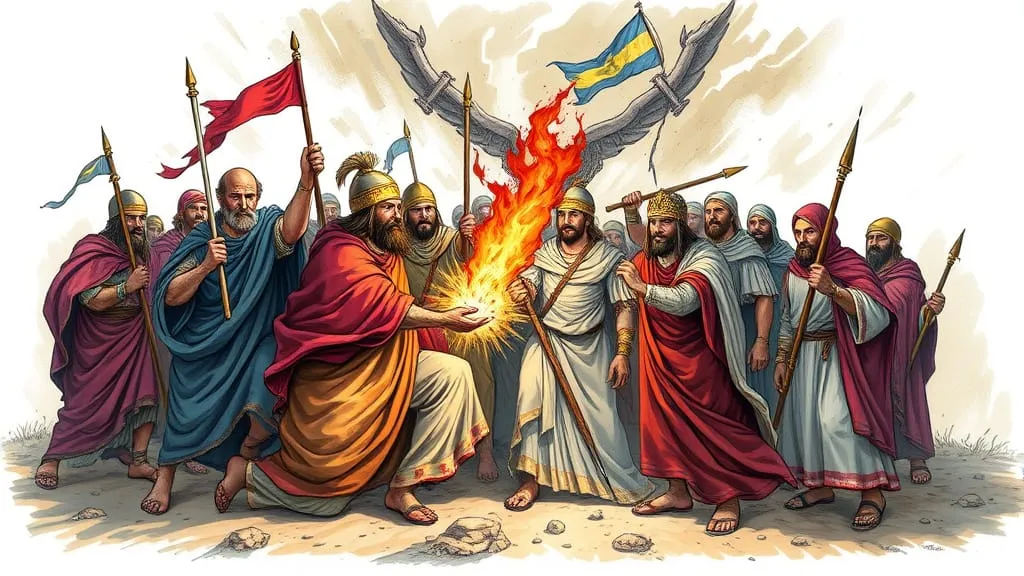Men read the Book of 1 Maccabees and see a story of heroes. They see a glorious, righteous rebellion against oppression, a blueprint for holy war. They get inspired by the zeal of Mattathias and the military genius of Judah the Hammer. They have turned a divine cautionary tale into a license for their own religious violence. They are completely blind.

1 Maccabees is not a model to be emulated. It is the definitive spiritual autopsy of the pious ego reacting with the flesh. It is the story of what happens when men try to defend God, and in doing so, prove they know nothing of Him.
1. The Abomination is a Spiritual Test
The setup is a classic spiritual crisis. The tyrant Antiochus Epiphanes, representing the spirit of the world, seeks to desecrate the inner temple, your consciousness. He outlaws the external signs of the covenant and erects an "abomination of desolation." This is the world's attempt to force you to abandon the Spirit and bow down to the rational, godless ego. The question is not if this will happen, but how you will respond.
2. Mattathias is the Religious Ego in a Fit of Rage
Faced with this test, the religious ego reacts. "He burned with zeal and his heart was stirred." (1 Maccabees 2:24). This is not the Spirit of God. This is human passion, the fire of the flesh. And what does it do? It commits murder. He kills the apostate Jew and the king's official.
This is the original sin of all religious violence. It is the ego, draped in piety, playing God. It is a direct violation of the entire law of the Spirit.
- Jesus said, "turn the other cheek," which means do not be angry. Mattathias was consumed by it.
- James said, "Human anger does not produce the righteousness that God desires." (James 1:20). Mattathias's entire rebellion was founded on it.
- The path of the Spirit is to "ignore evil," not to react to it. Reacting gives it power and makes you a part of its violent cycle. Mattathias did not ignore evil; he became a mirror image of it, answering one act of violence with another.
3. Judah the Hammer is the Arm of the Flesh
Judah Maccabee is a brilliant general. He is a master of worldly warfare. He wins battles, he purifies the physical temple, he restores the external religion. The world calls this a great victory. Spiritually, it is a catastrophic failure.
They fought a carnal war to defend a carnal system. They saved the shadow, the physical Temple, the external Law, but they did it with the weapons of the flesh: the sword, the spear, and the angry heart. Their victory was a worldly one, and it led to a worldly kingdom: the corrupt Hasmonean dynasty, which ultimately consumed itself in its own lust for power.
The Spirit's way is revealed by the archangel Michael, who "did not himself dare to condemn [the devil] for slander but said, ‘The Lord rebuke you!’" (Jude 1:9). He did not fight his own battle. The Maccabees took the sword into their own hands. They trusted the arm of the flesh, and they got the fruit of the flesh: a century of political strife and bloodshed.
4. The Book is a Warning, Not a Blueprint
1 Maccabees is the Old Testament's most vivid illustration of the "letter that kills." It is the story of men so in love with the external symbols of their faith that they were willing to murder for them. They fought for the freedom to perform their religious rituals, but they never found the freedom from the anger and pride in their own hearts.
The book is not in some Bibles because its spirit is the spirit of man, not of God. It is a testament to the fact that you can win a war for your religion and lose your soul in the process. It is the story of the ego picking up a sword to defend God, and in doing so, proving it knows nothing of Him at all.